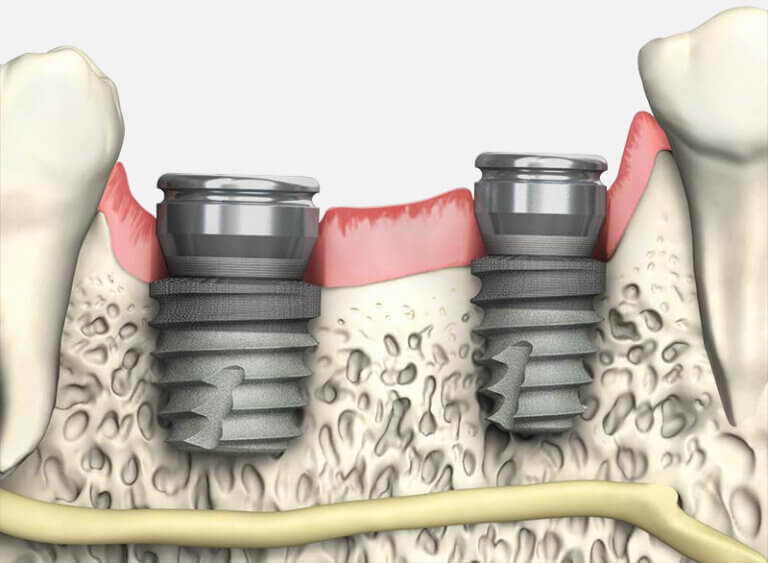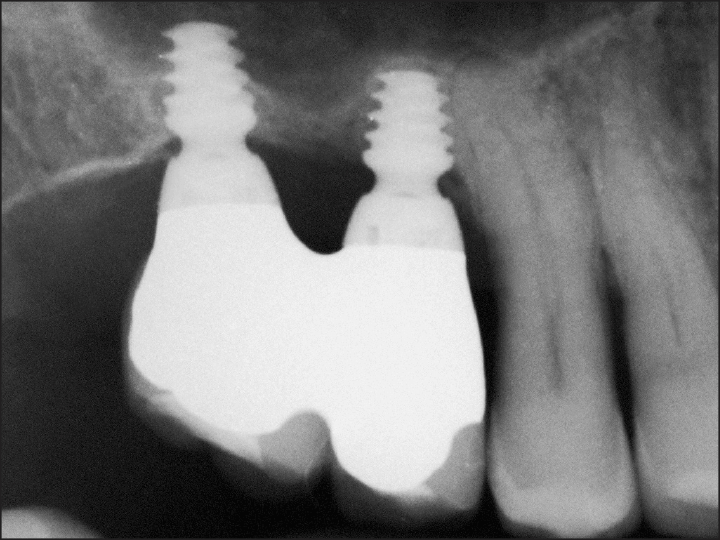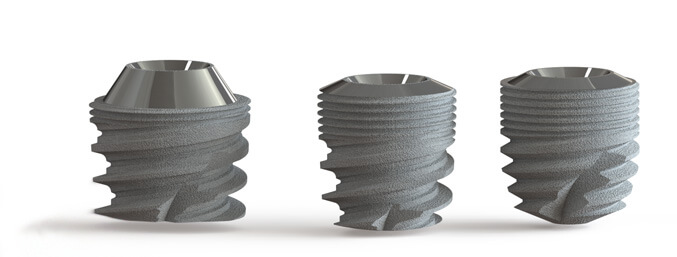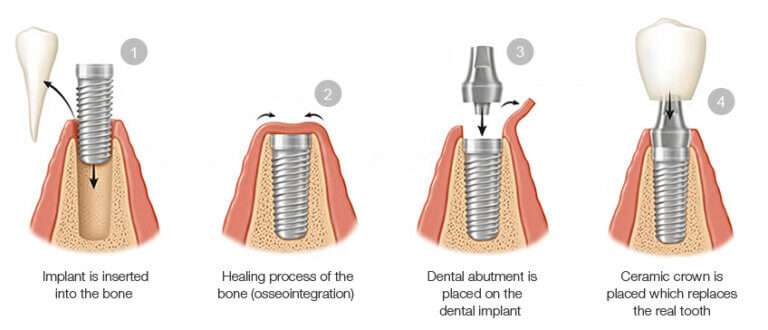Short Dental Implant

What Are Short Dental Implants?
Short dental implants are a specialized type of dental implant designed to replace missing teeth in areas with limited vertical bone height—without the need for extensive bone grafting. Typically measuring 8 mm or less in length, short implants provide a reliable solution for patients who may not be ideal candidates for traditional, longer implants due to bone loss or anatomical limitations.
Short implants such as Bicon Implants are especially useful in the posterior (back) regions of the mouth, where the proximity to the sinuses or nerve canals can make full-length implants risky or impractical. With advances in implant design, materials, and surface technology, short implants can now offer excellent long-term success rates, comparable to conventional implants.
These implants are often preferred for their minimally invasive placement, reduced healing times, and lower surgical complexity—making them an attractive option for both patients and clinicians seeking a more conservative approach to tooth replacement.
Before deciding whether Short Dental Implants are right for you, here are some important points to consider:
- Who Needs Short Dental Implants?
- Benefits Of Short Dental Implants
- Alternative Treatments For Missing Teeth
- How Much Do Short Dental Implants Cost?
- Steps In The Short Dental Implants Procedure
- Frequently Asked Questions About Short Dental Implants
If you have any further questions about Short Dental Implants or other dental services offered at Atlas Dental, please contact us.

Free phone consultation
Have questions about short dental implants? Schedule a free phone consultation with our Toronto dentist.

5 star google reviews
Our patients love us! See for yourself why people are choosing Atlas Dental in Toronto for short dental implants.

Dental Implant Emergency service
Broke a tooth and need a dental implant? Book an emergency appointment today.
Who Needs Short Dental Implants?
Short dental implants are an excellent option for patients who need tooth replacement but face certain anatomical or surgical limitations. Here’s who may benefit most from this implant type:
- Patients with Limited Bone Height: If you have insufficient bone height due to tooth loss, proximity to the maxillary sinus (in the upper jaw), or closeness to the inferior alveolar nerve (in the lower jaw), short dental implants can often be placed without the need for complex bone grafting or nerve repositioning.
- Those Seeking a Minimally Invasive Procedure: Short implants typically require less surgical intervention, leading to quicker healing, fewer complications, and a more comfortable recovery process.
- People with Missing Back Teeth: Short implants are commonly used to restore molars or premolars, especially in areas where vertical space is limited due to sinus or nerve proximity.
- Denture Wearers Seeking More Stability: Short dental implants can be used to stabilize loose dentures, offering improved comfort and functionality.
- Patients Looking for Long-Term Results Without Bone Grafting: Thanks to advancements in implant design, short implants now offer high success rates, even in challenging anatomical zones.
If you’ve been told you don’t have enough bone for traditional implants due to being close to the sinus or nerve, short dental implants may offer the solution you need. If you have further questions about Bicon Dental Implants, please contact us.

Benefits of Short Dental Implants
Short dental implants offer many of the same advantages as standard implants, with added benefits for patients with limited bone height or anatomical challenges:
- Minimally Invasive Placement: Short implants often eliminate the need for bone grafting or sinus lifts, resulting in less surgical complexity and a faster recovery.
- High Success Rate: Thanks to modern materials and design, short implants have a comparable success rate to longer implants—especially in carefully selected cases.
- Ideal for Challenging Areas: Perfect for replacing teeth in areas close to the maxillary sinus or inferior alveolar nerve, where standard implants may not be feasible.
- Cost-Effective Option: By avoiding additional surgeries like grafting, short implants may reduce overall treatment costs and simplify the process.
Short dental implants are an innovative and effective solution for many patients who were once told they weren’t candidates for traditional implants. If you’d like to explore whether short implants are right for you, contact us today.
Alternative Treatments For Missing Teeth
If short dental implants aren’t the right fit for you, there are several alternative treatments available:
- Indirect Sinus Lift: A bone augmentation procedure that gently elevates the sinus floor, allowing for placement of longer implants in the upper jaw when bone height is limited.
- Lateral Window Sinus Lift: A more advanced grafting procedure where a window is created in the side of the sinus wall to add bone material, increasing vertical height for traditional implants in complex cases.
- Removable Dentures: A cost-effective option that can replace multiple missing teeth, but may not provide the same stability as implants.
- Fixed Dental Bridges: These involve placing artificial teeth anchored by crowns on adjacent healthy teeth.
- Resin-Bonded Bridges (Maryland Bridges): A conservative option that requires minimal alteration of neighboring teeth.
Your dentist will carefully assess your unique situation, discuss the available options, and help you make an informed choice that best aligns with your preferences and long-term oral health goals. If you have further questions about Short Dental Implants, please contact us.

Cost of Dental Implants
A cost of a basic Dental Implant can start from $4165, which includes the dental implant surgical placement, and the dental implant crown, plus any applicable material expense and dental lab fees. Zirconia (ceramic) dental implants cost slightly more. The codes relevant to dental implants in the Ontario Dental Association’s Suggested Fee Guide appear as follows:
Implants, Osseointegrated, Root Form, More than one component
- 79931 – Surgical Installation of Implant with Cover Screw – per implant: $1785+ Dental Materials Expense (approximately $350; for zirconia (ceramic) implants is approximately $450)
Crowns, Porcelain/Ceramic/Polymer Glass Fused to Metal
- 27215 – Crown, Porcelain/Ceramic/Polymer Glass Fused to Metal Base, Implant-Supported: $1280 + Dental Lab Fee + Dental Materials Expense (approximately $650-800)
Depending on your unique circumstance, implant surgery may be more expensive if any of the following is required:
- Tooth removal
- CBCT scanning
- Computer guided implant surgery
- Bone grafting
- Gum grafting
- Indirect sinus lifting
- Lateral window sinus lifting
Dental Implant services are usually considered a supplementary service by dental insurance plans and may or may not be covered by your dental insurance. Be sure to find out from your dental insurance plan provider how much you are eligible for before going ahead with dental treatment. Your dentist can help you submit an predetermination to your dental insurance.
For patients without dental insurance, Atlas Dental is pleased to offer dental financing through iFinance Dentalcard. Affordable payment plans start at 7.95% for terms of 6 months to 6 years. To learn more about Dentalcard dental treatment financing, follow this link.
Steps In The Short Dental Implants Procedure
The short dental implant procedure is a well-orchestrated process that involves multiple stages, each crucial to ensuring a successful and long-lasting outcome.
- Initial Consultation: Your dentist will evaluate your oral health and take necessary scans to create a personalized treatment plan.
- Site Preparation: If needed, teeth extractions or bone grafts will be done to prepare the implant site.
- Implant Placement: The short titanium post is inserted into your jawbone through a minor surgical procedure.
- Osseointegration: Over the next few months, the short implant fuses with the bone to create a stable foundation.
- Abutment and Restoration: Once the short implant is secure, an abutment is placed, followed by the final restoration (crown or denture).
If you have further questions about Short Dental Implants, please contact us.

Frequently Asked Questions About Short Dental Implants
- How long do short dental implants last?
With proper care, short dental implants can last 10–15 years or more, similar to standard implants. Good oral hygiene and regular dental checkups are key to maximizing their lifespan.
- Are short dental implants as successful as regular implants?
Yes. Thanks to advancements in implant design and surface technology, short implants now have a comparable success rate to traditional implants—typically around 90–95%, especially in properly selected cases.
- Is the procedure for short implants less invasive?
Yes. Short dental implants often eliminate the need for bone grafts or sinus lifts, making the procedure less invasive with a faster recovery time than standard implants.
- Are short implants covered by dental insurance?
Coverage varies. Some private insurance plans may cover part of the cost if the treatment is deemed medically necessary. Always check with your provider and ask your dentist for a pre-authorization.
- Do short implants require special care?
No. Short dental implants are cared for just like regular teeth—brushing, flossing, and routine dental visits will help ensure their long-term success. Please review our dental implant home care instructions.
Dental implants are a durable and natural-looking solution for replacing missing teeth, offering improved function and aesthetics. If you have further questions about Dental Implants, please contact us.

